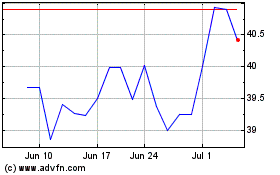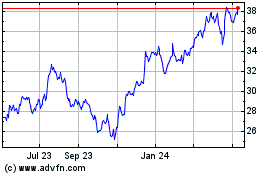Whistleblowers Helped SEC Bring $415 Million Settlement Against Bank of America -- Update
March 19 2018 - 3:09PM
Dow Jones News
By Jenny Strasburg and Dave Michaels
The Securities and Exchange Commission on Monday announced its
biggest-ever whistleblower awards, with roughly $83 million
combined going to three whistleblowers who helped the regulator
reach a $415 million settlement with Bank of America Corp.,
according to an SEC statement and a lawyer representing the
whistleblowers.
That 2016 settlement was the SEC's second-biggest against a Wall
Street bank. As part of the agreement, Bank of America resolved
accusations that it misused customer cash and securities to
generate profits, putting billions of dollars of customer assets at
risk over a roughly six-year period.
The SEC, in keeping with its usual practice, didn't specify
Monday which settlement the whistleblower awards were connected to.
But Jordan Thomas, a partner at Labaton Sucharow LLP who advises
corporate whistleblowers, said he represented the three award
recipients cited anonymously in the SEC announcement. Two
recipients together were awarded roughly $50 million and another
about $33 million.
Mr. Thomas confirmed that the whistleblowers provided original
information to the SEC that helped the regulator in its
investigation.
An SEC spokesman declined to comment.
Bank of America admitted to wrongdoing in agreeing to the 2016
settlement. In a statement at the time, the bank said, "While no
customers were harmed and no losses were incurred, our
responsibility is to protect customer assets and we have dedicated
significant resources to reviewing and enhancing our processes. The
issues related to our procedures and controls have been
corrected."
A chunk of the settlement covered a series of complex trades
conducted from 2009 to 2012 that the SEC said lacked economic
purpose and were designed to boost profits by artificially reducing
the amount of walled-off deposits Bank of America safeguarded as a
cushion in case of financial trouble.
The Wall Street Journal first reported details of those trades
and the SEC probe in April 2015. The Journal described billions of
dollars of loans structured by the Charlotte, N.C.-based bank's
Merrill Lynch unit, and extended to customers recruited
specifically to receive the loans. Inside Merrill Lynch, the
strategy was dubbed "leveraged conversion." It helped the bank
reduce the amount of reserves it segregated in what are known as
"lockup" accounts.
Lockup money can be enticing, because rather than idle in
reserve, it can be used to generate profits. Securities-law
provisions require minimum lockup amounts to protect customers who
might need to be paid in an emergency.
Some traders called the math behind the Merrill Lynch trades
"fugazi P&L, " or phony profit and loss. Some managers in the
bank at times told colleagues that the SEC had signed off on the
same trades that ultimately led to a portion of the bank's
settlement, the Journal reported in 2015.
The SEC said Monday that the record awards show that
whistleblowers can provide "incredibly significant information"
that can help the regulator remedy serious violations. The previous
record SEC whistleblower award was $30 million, in 2014.
SEC awards since 2012 now total more than $262 million to 53
whistleblowers. The money comes out of monetary sanctions paid to
the SEC.
"These courageous executives are a shining example for other
people on Wall Street with integrity and are likely to lead to an
increase in corporate whistleblowing," Mr. Thomas said Monday of
the latest awards.
Write to Jenny Strasburg at jenny.strasburg@wsj.com and Dave
Michaels at dave.michaels@wsj.com
(END) Dow Jones Newswires
March 19, 2018 14:54 ET (18:54 GMT)
Copyright (c) 2018 Dow Jones & Company, Inc.
Bank of America (NYSE:BAC)
Historical Stock Chart
From Mar 2024 to Apr 2024

Bank of America (NYSE:BAC)
Historical Stock Chart
From Apr 2023 to Apr 2024
